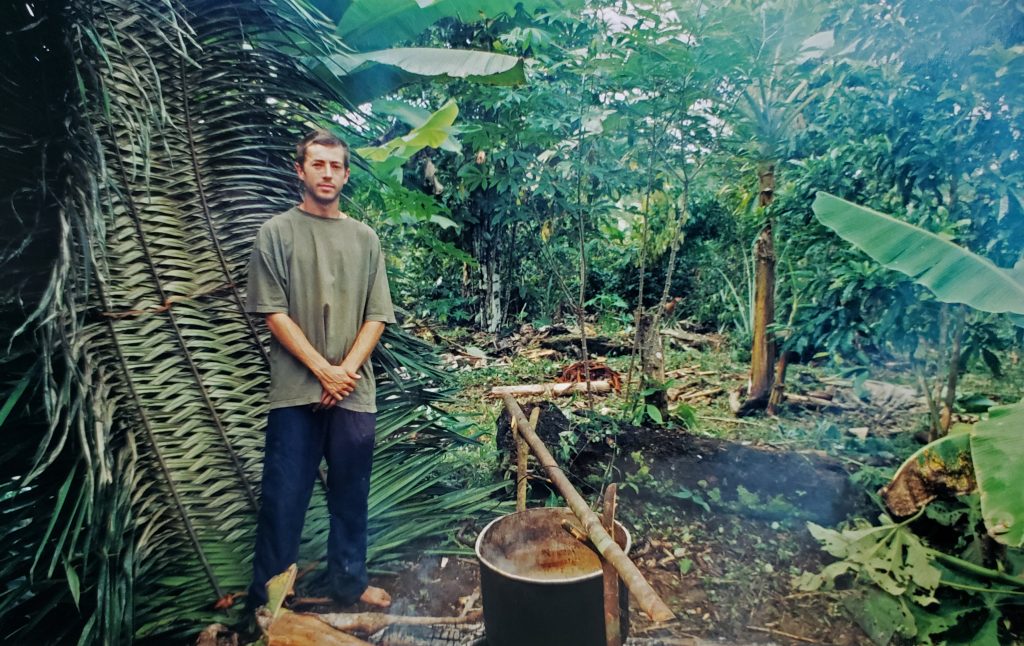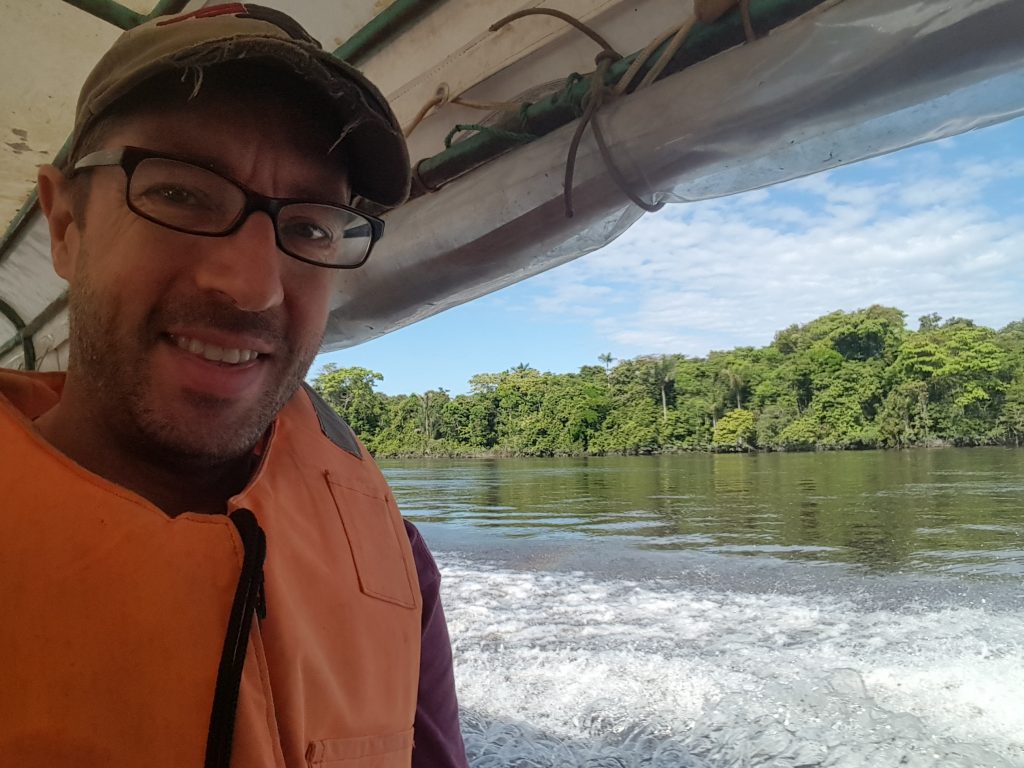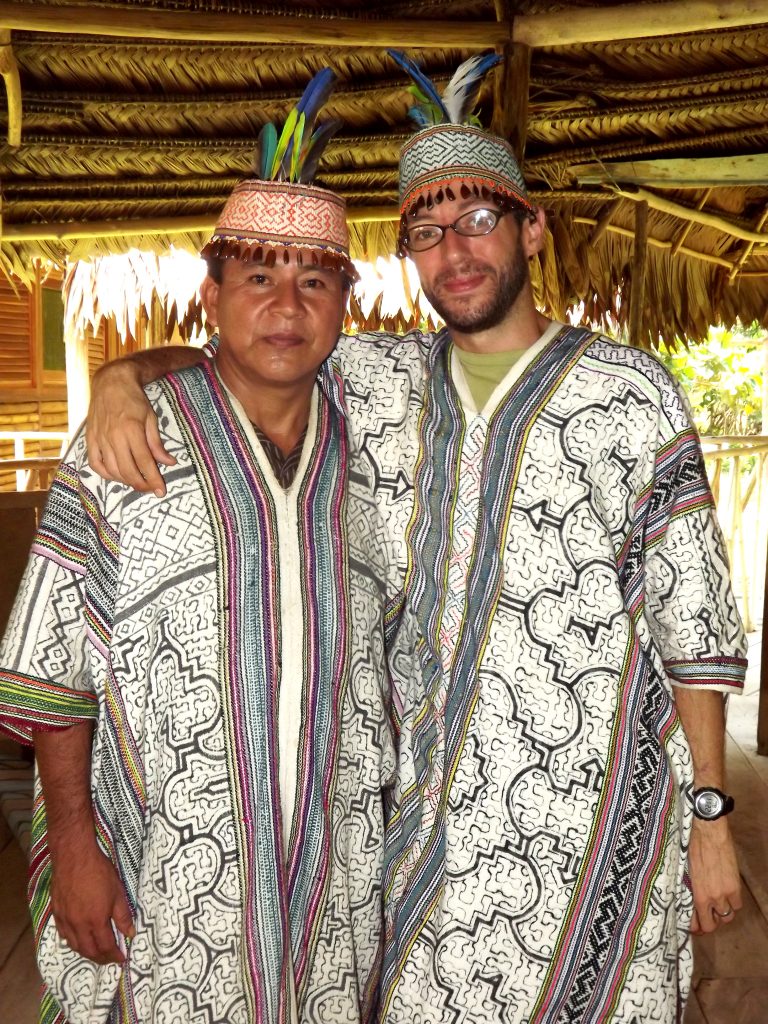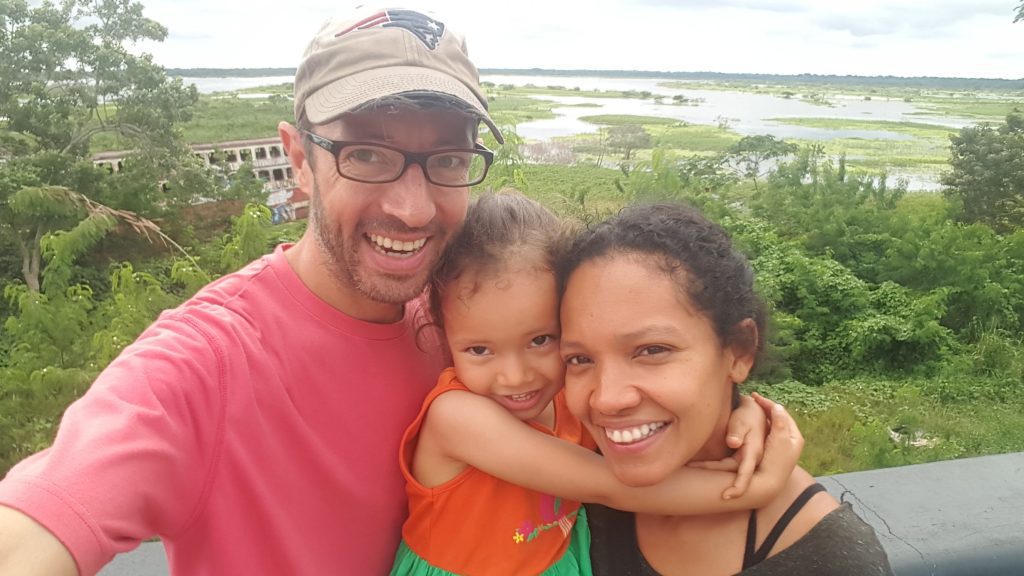
Carlos Tanner woke up in his car in the darkness and realized he was in serious trouble. Moonlight reflected off the water shown that his car was sinking. Carlos, talented and only in his twenties at the time, had blacked out behind the wheel and crashed into the Manhan River in Easthampton, Massachusetts. He had minutes to escape – or drown.
“I managed to climb out the window and swim to safety,” he said. “I’d hit rock bottom. It was that night I decided I had to do something drastic – or I would die soon.”
Two weeks later, Carlos was in the Amazon rainforest of Peru to meet a shaman, drink the plant medicine ayahuasca, and completely alter the course of his life.
Until then, Carlos had appeared to be living a successful life, working as a production manager for a local newsweekly. However, something deep down was not right. Increasingly depressed, the young professional turned to alcohol and drugs and spiraled into heroin addiction.
“Drug addiction is not like in the movies,” Carlos said. “I had a steady job, a nice house, and car. I appeared fine to everyone.
“After two years, I slipped out of control and didn’t care. I quit my job to work for the dealers. My downward spiral culminated in that night underwater in my car.”
Carlos’ intuition and research led him down an alternative healing route. He said, “I’m so grateful. Ayahuasca was the best decision of my life.”

The ayahuasca vine in the Amazon jungle.
Ayahuasca is a traditional plant medicine that has been used in indigenous cultures of the Amazon for thousands of years.
When people drink this sacred brew in the right ceremonial setting – and with proper guidance and support – many have found it extremely effective in treating a wide range of physical, mental and emotional health problems. However, due to its psychedelic effects and a lack of understanding about its proper use, ayahuasca is illegal in most Western countries and classed as a schedule 1 drug.
For Carlos, ayahuasca was crucial in being able to uncover and heal emotional wounds. Such childhood traumas are often at the root of addictions and unhelpful behaviors.

Carlos said: “It radically transformed my perceptions. I recalled and relived a key traumatic experience I had completely forgotten. I’d blamed myself for my parents’ divorce when I was eight, and for all the pain and suffering it had caused everyone. I thought I was a burden.
“This manifested in feelings I wasn’t deserving of love, that I didn’t matter. I was able to replace this with a true understanding that removed blame, guilt, and shame, and restored my self-love.
“I wrote to my parents the next day and began the healing process. I knew I would never do heroin again, and I never did.”
Carlos healed an unresolved digestive issue in the next ceremony. The shaman, Don Juan Tangoa, told Carlos that he had a calling to plant medicine and invited the young American to live with him in Iquitos and become his apprentice.

Studying the healing tradition of ayahuasca with his teacher from 2004 until 2008, the pair set up healing retreats. In 2007, Carlos created an educational course to spread the wisdom of plant medicine, the ancestral healing traditions that sustained humankind for tens of thousands of years.
He founded the Ayahuasca Foundation, which became a legally registered non-profit organization in 2009.
Joining forces with a Shipibo tribe curandero named Don Enrique Lopez, they began offering healing retreats and educational courses.

Since then, the foundation has offered more than 40 courses and 100 retreats. In 2017, they opened a retreat and research center which now hosts the world’s first and only government-funded ayahuasca research project.
Carlos said: “Research funded by the NHS in England and conducted at our center focuses on psychological benefits derived from treatment with ayahuasca and plant medicine.
“The results have been incredibly promising, demonstrating that afflictions like depression, anxiety, PTSD, and childhood trauma can be drastically reduced through the treatment and that benefits are long-lasting.
“Research will soon be expanded to include other physical afflictions like chronic pain.
“King’s College of London has joined the NHS in collaboration with the research team to provide more funding and support. We envision a future soon where psychedelic therapy is a reality.”
In 2019, John Hopkins University and the Imperial College of London opened centers for psychedelic research.
Carlos, now back living in Massachusetts with his wife and daughter, commutes to Peru several times a year to continue managing the Ayahuasca Foundation.

The Ayahuasca Foundation has given full support to a grassroots movement spreading rapidly across the world.
On February 20, more than 100,000 people will ‘come out’ on social media worldwide with their stories of personal healing and transformation, using the hashtag #ThankYouPlantMedicine.
Carlos said: “Our team supports the #ThankYouPlantMedicine movement. With more awareness, more people will finally be able to find fulfillment in their lives.”
* Want to join the #ThankYouPlantMedicine movement on Facebook? Come join our community by clicking here.
* Would you like to help spread our message and support the #ThankYouPlantMedicine movement as a volunteer? Please click here for more details.
* DISCLAIMER & IMPORTANT SAFETY MESSAGE
The #TYPM movement does not encourage any illegal use or abuse of plant medicines and psychedelics, whether cultivated in nature or lab synthesized.
Psychedelics and plant medicines, even within the confines of applicable laws, are not appropriate or beneficial for everyone. They are not magical cures but are tools that when used properly – with respect, clear intentions, guidance, and a safe, supportive environment – can catalyze personal growth and healing.
To minimize harm and increase therapeutic potential, it is imperative that one performs sufficient research, adequately prepares, and integrates their own experience.




